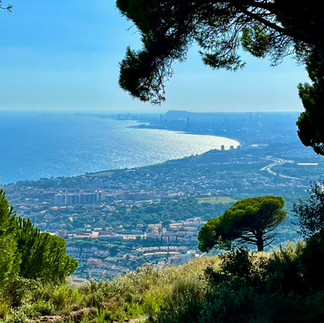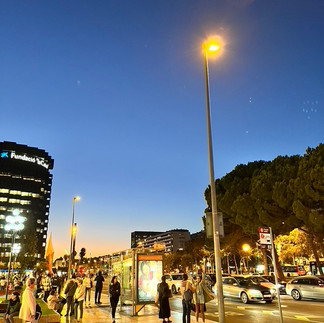1714
- Jan Dehn

- Nov 3, 2025
- 6 min read
Updated: Nov 10, 2025

There is a reason why pick-pockets like Barcelona (Source: own photo)
Have you ever wondered why there are so many pick-pockets in Barcelona? Well, it is a well-known fact in petty criminal circles that Barcelona is the best place in the world to nick credit cards. Here, you see, you have a roughly one-in-two chance of correctly guessing the PIN code of the card in your first attempt, because half of all Barcelonians use the number ‘1714’ as their PIN code.
Why on earth is ‘1714’ such a popular PIN code? To answer this question, we have to go all the way back to the War of Spanish Succession (1701-1714). Bear with me, we will get back to Barcelona soon enough and then everything will make total sense, but first we must make a detour of power politics in Europe In the 1600s.
______
In the late 17th Century, Europe was ruled by a small number of prominent royal families. There was extensive inbreeding within these families, which naturally led to poor genetics and a pervasive problem of childlessness. Childlessness was serious issue for the royals, because succession hinged on passing power down the family line. In November 1700, the issue of childlessness came to head in Spain, when King Charles II, an inbred misfit, died without an heir.
Who would inherit the Spanish throne?
View towards Barcelona from north east (Source: own photos)
At this time, the Bourbons of France and the Habsburgs of Germany, both prominent royal families, were the big powers in Europe. The Bourbons had assumed power in 1589 and ruled France, Spain and large parts of Italy until the French Revolution in 1792. The Habsburgs, who traced their origins to Switzerland in 1020 were a German dynasty, which had acquired power through conquest and strategic marriages. The Habsburgs ruled large swathes of Europe from the 15th to the 20th century, including Austria, and, for nearly two centuries, the Spanish empire as well. The Habsburg Dynasty collapsed with the Austria-Hungarian Empire in 1918.
Locked in competition for power in 1700, the Habsburgs and the Bourbons both saw an opportunity to secure control over Spain as Charles II, a Habsburg, lay dying. Due to exceptionally poor economic management of Spain by first the Catholic Monarchs and then the Habsburgs in the two centuries since the completion of the Reconquista in 1492. Spain was both economically and politically weak. It also happened to control a vast empire with territories in Europe (Lombardy, Belgium, Southern Italy and Sicily, Corsica, Sardinia), the Spanish Americas, and the Philippines. The Bourbons therefore saw Spain as an easy and juicy target for French expansionism. Moreover, the Bourbons, who were led by Louis IVX, the most powerful king in French history, maintained that the Spanish throne belonged to his son Louis, Dauphin of France, whose mother, Maria Theresa, was the daughter of Spanish King Philip IV.
Standing between the Bourbons and their Spanish ambitions, however, were the Habsburgs, who also claimed to have a right to the Spanish throne. Habsburg ruler Leopold I insisted that his son, the Archduke Charles, who would later become Holy Roman Emperor, had a right to rule Spain due to the fact that Charles was the grandson of Spain’s King Philip III.
Barcelona views from Montjuic (Source: own photos)
While the Bourbons and Hapsburgs squabbled, the Dutch Netherlands and Britain looked on from the sidelines. Both powers were worried that if either the Habsburgs or the Bourbons secured control of Spain their empires would become far too strong. The Dutch and the English therefore wanted Spain to remain weak and divided.
As Charles II’s final demise drew ever nearer, the French on one side and the Dutch and the English on the other drew up a series of Treaties for how to divide Spain after Charles II’s death. This naturally upset Charles II, who was not even invited to the talks. He mustered the energy to draft a separate Will and Last Testament in response to each treaty with the specific aim of scuppering French-Dutch-British agreements.
To this end, Charles II was successful. He died without an agreement having been struck between the Bourbons and the Habsburgs. Charles II's last Will and Testament therefore became the default position; it named Philip V, a Bourbon, Duke of Anjou, and second grandson of Louis IVX, as King of Spain. This was unacceptable to the Habsburgs, who had no intention of ceding control of Spain to the Bourbons. Austria, the Dutch Netherlands, and Britain therefore formed a Habsburg ‘Grand Alliance’ and war broke out between the Grand Alliance and the Bourbons in 1701.
––––––
The War of Spanish Succession, which the war came to be known, lasted 13 years. Most of Europe’s major powers were sucked into the conflict, which claimed more than 1.2 million military lives plus the lives of an unspecified number of civilians.
When hostilities finally ended, France had lost its economic dominance and naval leadership to Britain, whose rise was just beginning. Austria took over Spanish Netherlands (today’s Belgium) and large parts of Italy. The Dutch were left bankrupt and ceded much of their merchant dominance to Britain.
Barcelona (Source: own photos)
However, the great irony of the war was that Philip V was still king of Spain, just as he had been before the war. Under the terms of the Treaty of Utrecht, Spain agreed not to unite with France, thereby addressing Habsburg and British concerns. In exchange for guarantees of independence and the right to retain the majority of its overseas empire, Spain gave up Spanish Netherlands, Gibraltar, Menorca, and most of its Italian possessions.
––––––
Which finally brings us back to Barcelona and Catalonia in general. At the start of the War of Spanish Succession, Catalonia had been on Philip V’s side, but switched sides in 1705 over concerns that the Spanish king would dissolve Catalonia’s independent government institutions. These institutions, the so-called Catalan Courts, had governed Catalonia since 1283, making them some the oldest parliaments in the world. Tensions between Catalonia and Spain escalated as the war drew to an end and in the middle of 1713 Spain sent troops to take control of Catalonia by military means. Catalonia resisted the attacks, firm in the conviction that they continue to be supported by their allies in the Grand Alliance.
Unfortunately, this conviction was misplaced. Britain withdrew support for Catalonia in exchange for taking formal ownership of Gibraltar and Menorca. Once Britain turned tail, Austria soon followed, leaving Catalonia without allies in its fight against Spain.
Modern Barcelona (Source: own photos)
In April 1714, Philip V offered Catalonia a negotiated solution, which would have given the region considerable autonomy, but by then Catalan leadership had barricaded itself in Barcelona and become so radicalised that it swore to fight Spain to the last drop of Catalan blood.
In July 1714, Louis XIV sent the French army under Marshal Berwick to lay siege to Barcelona. Fighting continued until 13 September, when Barcelona finally fell.
The war and its aftermath were disastrous for Catalonia. The battle alone had claimed some 25,000 lives. Under the Nueva Planta Decrees of 1716, Catalonia’s government, laws, and institutions were all abolished. Catalonia also faced heavy taxes as it was incorporated into Spain, while Catalan was banned as an official language. Catalan military officers were imprisoned and a fortress was built at the site of today’s Catalan Parliament in order to keep an eye on Barcelona’s rebellious populace. In short, the year 1714 marked the end of Catalonia as a independent nation, a trauma that remains etched into the memories of all good Catalans to this day.
––––––
Pro-independence Catalans no longer use violence in aid of their cause. Instead, they play a vital part in Spanish national politics, which pits conservatives, who support centralised power in Madrid against socialists and regionalists, who prefer more decentralised government.
As I type these words, the Prime Minister of Spain is Pedro Sanchez from the socialists, who governs with the backing of a number of smaller regional parties, including Catalans. In exchange for their support, Spain’s regional parties get plenty of funding from Madrid. These are therefore good times in Catalonia, which is why calls for independence are few and far in between.

These are good times in Catalonia (Source: own photo)
One day, however, the political tide will turn. The conservative Partido Popular, which traces its origins to Franco’s fascists will assume power in Madrid and the generous transfers to the regions will dry up, especially to the fiercely independent Basque and Catalan regions. This is when we will once again see a blossoming of militant pro-independence politics in Catalonia. Until then, however, Catalans will enjoy the fruits of their coalition with the socialists and make good use of their credit cards at Barcelona's many ATMs. And roughly half of them will type ‘1714’ to get money out. Now you know why.
The End




























Comments